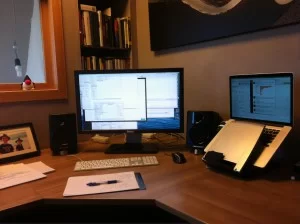My Five Rules for Remote Working
A couple of weeks ago, there was a stir (again) about remote working and its succes and/or failure: it was reported that Reddit, the website where many people lose countless of hours, were forcing all their employees to move to SF. After a similar thing happened at Yahoo last year it made me think about why remote work is such a huge success for us at Activiti and Alfresco.
You see, I’m a remote worker for more than five years now. First at Red Hat and then at Alfresco. I worked a couple of years as Java consultant before that, so I’ve seen my share of office environments (checking my Linkedin, it comes down to about 10 different office environments). I had to go to these offices each day.
Comparing those experiences, I can – without exaggeration – say that I’m way more productive nowadays, working from home. Many people (both in and outside IT) ask me how I do it. They say “they couldn’t do it”. Maybe that’s true. Maybe some people need a lot of people around them. But for the kind of job I am into – developing software – I believe having a lot of people around me doesn’t aid me in writing higher quality software faster.
Anyway, like I said, I did some thinking around it and I came to the following “rules” which I have been following all these years which I believe are crucial (at least for me!) to making remote working a success.

Rule 1: The Door
Having a separate space to work is crucial when wanting do serious remote working. Mentally it is important that you can close “The Door” of your office space when you finished working. It brings some kind of closure to the working day.
Many people, when they work from home, put their laptop on let’s say the kitchen table. That doesn’t work. It is not a space that encourages work. There are distractions everywhere (kids that come home, food very close by, …). But most importantly, there is no distinction between when you are working and when you are not.
My wife and kids they know and understand that when The Door is closed, I’m at work. I can’t be disturbed until that Door opens. But when I close The Door in the evening and come downstairs, they also know that I’m fully available for them.

Rule 2: The Gear
The second rule is related to the first one: what to put in that room. The answer is simple: only the best. A huge desk, a big-ass 27″ monitor (or bigger), a comfortable chair (your ass spends a lot of time on it), the fastest internet you can buy, some quality speakers, a couple of cool posters and family pictures on the wall, ….
This is the room where you spend most of your time in the week, so you need to make it a place where you love to go to.

Often, I hear from people which company allows for remote work that their company should pay for all of this. I think that’s wrong. It’s a two-way street: your company gives you the choice, privilege and trust to work from home, so you from your side must take care that your home office isn’t decreasing anything compared to the office gear you have. Internet connection, chair and computer monitor are probably the most important bits here. If you try to be cheap on any of those, you’ll repay it in decreased productivity.
Rule 3: The Partner
Your partner is of utmost importance to make remote work a success. Don’t be fooled by the third place here, when your partner is not into it, all the other points are useless.
It’s pretty simple and comes down to one core agreement you need to make when working from home: when you are working from home you are not “at home”. When you work, there is no time for cleaning the house, doing the dishes, mowing the grass, etc … You are at work, and that needs to be seen as a full-time, serious thing. Your partner needs to understand that when you would do any of these things, it would be bad for your career.
Many people think this is easy, but I’ve seen many fail. A lot of people still see working from home as something that is not the same as “regular work”. They think you’ve got all the time in the world now. Wrong. Talk it through with your partner. If he/she doesn’t see it (or is jealous), don’t do it.
Rule 4: Communicate, communicate, communicate
More than a team in an office, you need to communicate. If you don’t communicate, you simply don’t exist.
At Activiti, we are skyping a lot during the day. We all know exactly what the other team members are currently doing. We have an informal agreement that we don’t announce a call typically. You just press the ‘call’ button and the other side has to pick it up and respond. It’s the only way remote work can work. Communicate often.
Also important: when you are away from your laptop, say it in a common chat window. There is nothing as damaging for remote workers as not picking up Skype/Phone for no reason.
Rule 5: Trust People
The last rule is crucial. Working remote is based on trust. Unlike in the office, there is no physical proof that you are actually working (although being physically in an office is not correlated with being productive!). You need to trust people that they do their job. But at the same time, don’t be afraid to check up on people’s work (for us, those are the commits) and ask the questions why something is taking longer than expected. Trust grows both ways.
The second part of this trust-story is that there needs to be trust from the company to the team. If that trust is missing, your team won’t be working remote for long. At Activiti, we are very lucky to have Paul Holmes Higgin as our manager. He is often in the office of Alfresco and makes sure that whatever we are doing is known to the company and vice versa. He attends many of the (online) meetings that happen company wide all the time so that we are free to code. There is nothing as bad for a remote team as working in isolation.
Conclusion
So those are my five (personal!) rules I follow when working from home. With all these bad press from the likes of Reddit and Yahoo, I thought it was time for some positive feedback. Remote work is perfect for me: it allows me to be very productive, while still being able to see my family a lot. Even though I put in a lot of hours every week, I’m still seeing my kids grow up every single day and I am there for them when they need me. And that is something priceless.
| Reference: | My Five Rules for Remote Working from our JCG partner Joram Barrez at the Small steps with big feet blog. |





Hear hear!
Some very good points there.
Great to read a positive example of remote working, thank you. And glad you mentioned ‘the trust thing,’ it’s such an important part of making remote teams functions well!
I also work 60% fro home office. I agree with all of your rules!!!but need to improve rule #2 that very good point, as we spend most of our time at office